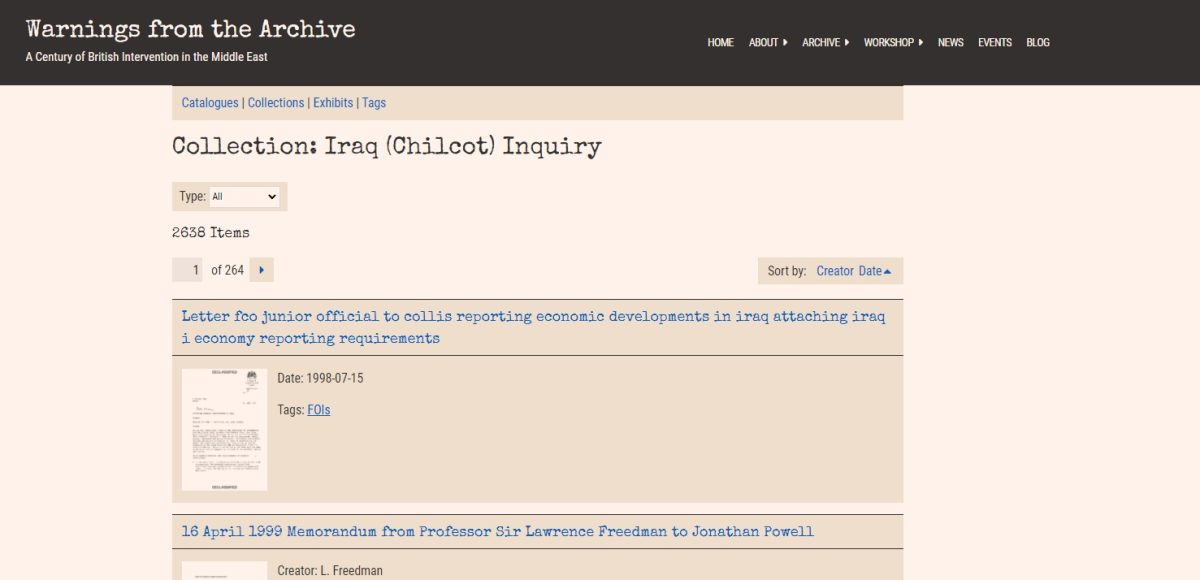Working paper given by Dr Owen Thomas at the ‘Intelligence, surveillance, and oversight: tracing connections and contestations’ conference, held by GUARDINT project (‘Intelligence and Oversight Networks: Who Guards the Guardians’) on 26th and 27th January 2022.
Tag: public inquiries
The Chilcot Inquiry and Human Rights
By Rhys Edwards
This blog focuses on former Labour MP Ann Clwyd and her emphasis on human rights as a motivation in Labour’s invasion of Iraq in 2003. It examines first, her efforts to prosecute Iraqi leader Saddam Hussain and other members of the Iraqi administration under international law, secondly, her decision to support the invasion of Iraq, and, thirdly, her testimony to the Chilcot Inquiry. Looking back at the 2003 invasion and the subsequent Chilcot Inquiry, how can we think critically about the British government’s interpretation(s) of human rights before the war in Iraq? Can the evidence compiled by the Chilcot Inquiry provide clarity for why human rights were so integral to Labour’s ‘marketing’ of the invasion to the British electorate?
Individualisation of State War Crimes
This week we discuss the critique of the Iraq Historic Allegations Team (or IHAT) that it failed to ‘bring justice’ and address the atrocities committed by British troops against Iraqi civilians during the Iraq war. The IHAT investigation lasted from 2010 until its subsequent dissolvement in 2018, running largely in parallel with the Iraq ‘Chilcot’ Inquiry. This post reflects upon an archival Guardian podcast episode from 2018 titled “Why we may never know if British troops committed war crimes in Iraq” and considers the limitations of international criminal justice and legal forms of individualisation in addressing war crimes committed by state soliders.
An Accidental Admission of Guilt?
George W. Bush mistakenly described the Iraq Invasion as “wholly unjustified” and “brutal” in recent speech. In a recent speech on Wednesday (18th May 2022), former United States president George W Bush reminded the world of the ongoing consequences of the 2003 U.S. invasion of Iraq and the violence of the intervention.
In 1991, following the First Gulf War, Saddam Hussein remained in power in Iraq. However, just 12 years later, a US-led coalition of forces invaded Iraq with the intention of removing Hussein from power. This blog post examines the changes in US and British interests between 1991 and 2003 that facilitated his removal during the Second Gulf War.
Weekly Recommendations from WFTA
A quick update on what the Warnings from the Archive team have been listening to/reading/watching this week. The pieces that have caught our interest and develop the themes and topics explored by the project.

This week we are launching our unique archive. It is a database of thousands of .pdfs related to British foreign policy in Iraq. Our database is completely searchable and is complete with user-friendly exhibits to help students locate useful sources. The archive is the perfect place to find exclusive letters, internal memos, and interview transcripts that are unavailable elsewhere.
Public Trust and Inquiries
With the publication of Sue Grey’s internal inquiry into Downing Street’s lockdown parties expected imminently and the resumption of the inquiry into the Grenfell Tower fire, it is crucial to examine the impact of these inquiries upon our own research on the Chilcot Inquiry to interrogate those included in the scrutinising process and identify those who are excluded.
Geoff Hoon, Tony Blair’s defence secretary between 1999 and 2005, has revealed that he was instructed to burn a vital memo, sent by Lord Goldsmith the incumbent attorney general, that questioned the legality of the British invasion of Iraq.
What is the scandal of Afghanistan?
By Dr Owen Thomas
This blog is based a talk given as part of the “Reflections for “Twenty Years of the Global War on Terror: Looking back, looking forward” event, jointly hosted by the Secrecy, Power and Ignorance research Network (SPIN) and the South West Doctoral Training Partnership on 8th September, 2021.
This month, two parliamentary select committees have announced that they will hold inquiries into aspects of the UK’s withdrawal from Afghanistan. An ‘Afghanistan Inquiry’ has been called for many times in 2021.1 But reaction to the Taliban’s unexpectedly sudden seizure of Kabul and the West’s rapid evacuation has hastened and sharpened these calls, such that both the Defence Committee and the Foreign Affairs Committee will use much of their inquiries to focus on that withdrawal. A striking feature of the British reaction to that withdrawal was the shock experienced by those who had been involved in two decades of Western operations in Afghanistan. During the BBC’s Question Time, for example, a British military veteran who served in Afghanistan told the panel: “the only way I cannot be utterly embarrassingly humiliated about my service is if we, a democratic nation, hold those responsible to account and have a full parliamentary inquiry.”